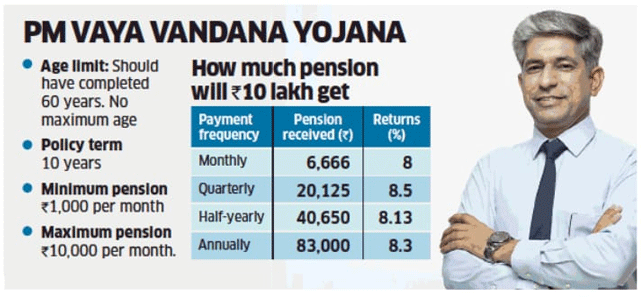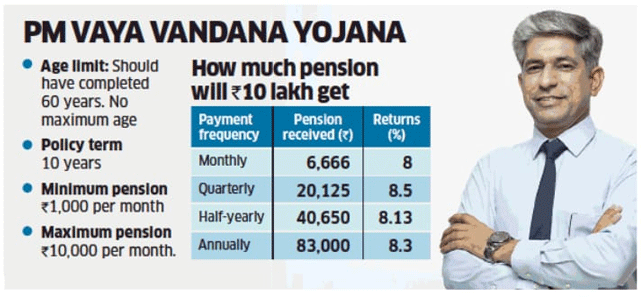
Feb
Pradhan Mantri Vaya Vandana Yojana (PMVVY) is a pension scheme available for senior citizens.

The Indian Government launched a pension scheme and it can be taken from 4 May 2017 to 31 March 2020. In the 2018-2019 Budget Speech, the Government of India increased the maximum limit to Rs.15 lakh under the Pradhan Mantri Vaya Vandana Yojana scheme.
The scheme can be bought via online and offline modes from Life Insurance Corporation (LIC) of India. The main aim of the scheme is to provide senior citizens with a regular pension during the time when there is a fall in interest rates.
Eligibility of PMVVY:
Given below are the eligibility criteria that individuals must meet in order to be eligible for the PMVVY scheme:
- Minimum age of entry: The individual must be 60 years or higher.
- Maximum age of entry: There is no limit.
- Duration of the policy: The tenure of the policy is 10 years.
- Minimum pension that is earned: The minimum pension for a month, quarter, half-yearly, and yearly are Rs.1,000, Rs.3,000, Rs.6,000, and Rs.12,000, respectively.
- Maximum pension that can be earned: Rs.10,000, Rs.30,000, Rs.60,000, and Rs.1,20,000 is the maximum pension that can be earned for a month, quarter, half-yearly, and yearly, respectively.
The entire family is considered when deciding the maximum pension ceiling. The family under this scheme consists of the pensioner, his/her dependents, and spouse.
How to apply:
A form needs to be filled up and requisite documents need to be attached along with the form. One can also invest in the scheme online at the following link: https://onlinesales.licindia.in/eSales/liconline;jsessionid=ED994DB57C625E21BF155420814808A0
Documents required:
- Copy of PAN card.
- Copy of address proof (Aadhaar, passport).
- Copy of cheque leaf or first page of bank passbook of the account in which pension needs to be credited
Benefits of PMVVY scheme:
Mentioned below are the benefits of the PMVVY scheme:
- Under the scheme, the pensioner will receive an assured return of 8% p.a. for the policy duration of 10 years.
- Pension Payment: In case the pensioner survives the duration of the policy, the pension will be paid in arrears. The pensioner can also choose the mode by which the pension must be made.
- Death benefit: The purchase price will be paid back to the beneficiary if the pensioner passes away during the policy tenure.
- Maturity benefit: If the pensioner survives the entire policy tenure, the purchase price will be paid along with the final pension instalment.
- Loan facility: After completing 3 years of the policy, the pensioner can avail loans against the policy. A maximum of 75% of the purchase price can be availed as a loan. The interest on the loan will be recovered from the pension payment that is being made. In case any loan has been sanctioned up to 30 April 2018, the rate of interest is 10% p.a. and it is payable half-yearly throughout the entire policy term.
- Free-look period: The policyholder can surrender the policy within 15 days if he/she is not happy with the terms of the policy. However, the free-look period is 30 days if the policy is bought online. The purchase price after the deduction of stamp charges will be refunded to the policyholder.
Purchase Price payment:
Individuals can buy the scheme by paying the purchase price in a lump sum. The pensioner can either choose the purchase price amount or the pension amount he/she will receive. Under the different modes, the minimum and maximum pension prices are mentioned in the table below:
| Pension mode | Minimum Purchase Price (Rs.) | Maximum Purchase Price (Rs.) |
|---|---|---|
| Monthly | 1,50,000 | 15,00,000 |
| Quarterly | 1,49,068 | 14,90,683 |
| Half-yearly | 1,47,601 | 14,76,015 |
| Yearly | 1,44,578 | 14,45,783 |
The Purchase Price will be rounded to the nearest rupee when it is being charged.
Pension payment modes:
Monthly, quarterly, half-yearly, and annual modes are the different modes of payment that are available. The payment of pension must be done via Aadhaar Enabled Payment System or National Electronics Fund Transfer (NEFT).
Depending on the mode of payment, the first transfer must be done within 1 month, 3 months, 6 months, or 1 year from the date the policy was bought.
Taxes on the Pradhan Mantri Vaya Vandana Yojana scheme:
If there are any Statutory Taxes that have been imposed by the Indian Government or another constitutional tax Authority of India, they will be as per the tax laws and the tax rates that are applicable. For the calculation of benefits that are payable under the PMVVY scheme, the amount of tax that is paid will not be taken into account.
Premature exit from the Pradhan Mantri Vaya Vandana Yojana scheme:
The requirement of money for treatment of terminal or critical illness for the policyholder of his/her spouse is the only circumstance where premature exit from the policy is allowed. 98% of the Purchase Price must be paid as the Surrender Value.
Examples of Pension Rates under the Pradhan Mantri Vaya Vandana Yojana scheme
Mentioned below are the pension rates for a Purchase Price of Rs.1,000 under the various pension payment modes:
- Monthly: Rs.80 p.a.
- Quarterly: Rs.80.50 p.a.
- Half-yearly: Rs.81.30 p.a.
- Yearly: Rs.83 p.a.
The above-mentioned rates are determined without considering the age. The instalment of pension that is being paid will also be rounded off to the nearest rupee.
Exclusion of the Pradhan Mantri Vaya Vandana Yojana scheme:
Suicide: The full purchase price is payable as there is no exclusion if the policyholder commits suicide.
LIC can inform the insured in case of any fraud related to the policy within 3 years from:
- The date from when the policy was issued.
- The date from when the risks commenced.
- The date from when the policy was revived.
- The date from when the rider was added to the policy, whichever is later.
The insurer must also provide the insured or his/her legal representative, or nominees with the details on why such an action was taken, and these details must be given in writing. Fraud under such circumstances means an act that is committed by the insured or his/her agent with an aim to deceive the insurer.
Source: www.bankbazaar.com, economictimes.com

